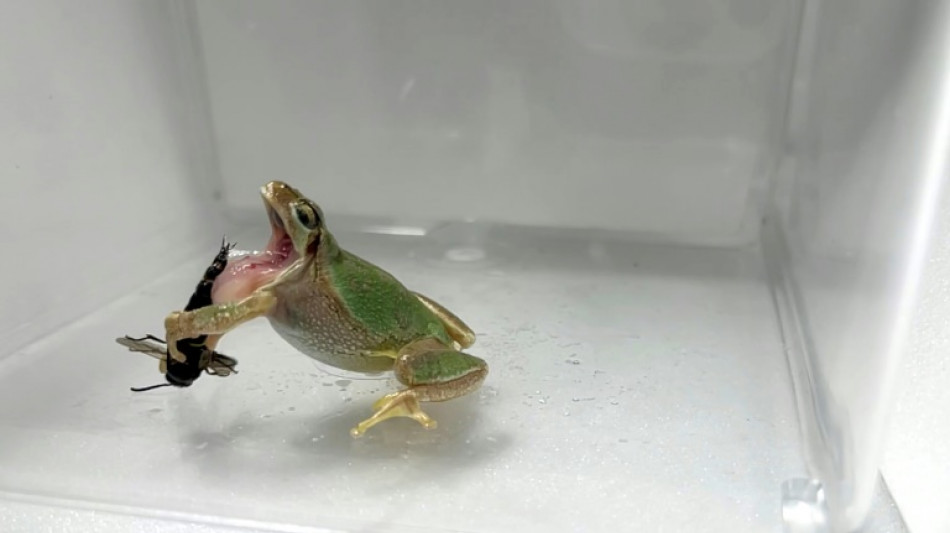
-
 EU leaders take stage in Davos as Trump rocks global order
EU leaders take stage in Davos as Trump rocks global order
-
Blast at Chinese restaurant in Kabul kills 7

-
 Warner hits 'Sinners' and 'One Battle' tipped for Oscar nominations
Warner hits 'Sinners' and 'One Battle' tipped for Oscar nominations
-
Colombian paramilitary-turned-peace-envoy sentenced over atrocities

-
 Gilgeous-Alexander leads Thunder in rout of Cavaliers
Gilgeous-Alexander leads Thunder in rout of Cavaliers
-
Seahawks blow as Charbonnet ruled out for rest of season

-
 Kostoulas stunner rescues Brighton draw after penalty row
Kostoulas stunner rescues Brighton draw after penalty row
-
Man Utd greats tell Martinez to 'grow up' as feud rumbles on

-
 LeBron James' All-Star streak over as starters named
LeBron James' All-Star streak over as starters named
-
Allies tepid on Trump 'peace board' with $1bn permanent member fee

-
 Ninth policeman dies in Guatemala gang riots, attacks
Ninth policeman dies in Guatemala gang riots, attacks
-
Man City's Foden to play through pain of broken hand

-
 Milan Fashion Week showcases precision in uncertain times
Milan Fashion Week showcases precision in uncertain times
-
Public media in Europe under unprecedented strain

-
 Africa Cup of Nations refereeing gets a red card
Africa Cup of Nations refereeing gets a red card
-
Tributes pour in after death of Italian designer Valentino

-
 Bills fire coach McDermott after playoff exit: team
Bills fire coach McDermott after playoff exit: team
-
Chile wildfires rage for third day, entire towns wiped out

-
 Valentino, Italy's fashion king who pursued beauty at every turn, dies at 93
Valentino, Italy's fashion king who pursued beauty at every turn, dies at 93
-
France PM to force budget into law, concedes 'partial failure'

-
 Allies tepid on Trump 'peace board' with $1bln permanent member fee
Allies tepid on Trump 'peace board' with $1bln permanent member fee
-
'My soul is aching,' says Diaz after AFCON penalty miss

-
 Ex-OPEC president in UK court ahead of corruption trial
Ex-OPEC president in UK court ahead of corruption trial
-
Iran warns protesters who joined 'riots' to surrender

-
 Stop 'appeasing' bully Trump, Amnesty chief tells Europe
Stop 'appeasing' bully Trump, Amnesty chief tells Europe
-
Central African Republic top court says Touadera won 78% of vote

-
 Trump tariff threat has global investors running for cover
Trump tariff threat has global investors running for cover
-
Spectacular ice blocks clog up Germany's Elbe river

-
 Trump says not thinking 'purely of peace' in Greenland push
Trump says not thinking 'purely of peace' in Greenland push
-
Syria's Kurds feel disappointed, abandoned by US after Damascus deal

-
 Man City sign Palace defender Guehi
Man City sign Palace defender Guehi
-
Under-fire Frank claims backing of Spurs hierarchy

-
 Prince Harry, Elton John 'violated' by UK media's alleged intrusion
Prince Harry, Elton John 'violated' by UK media's alleged intrusion
-
Syria offensive leaves Turkey's Kurds on edge

-
 Man City announce signing of defender Guehi
Man City announce signing of defender Guehi
-
Ivory Coast faces unusual pile-up of cocoa at export hubs

-
 Senegal 'unsporting' but better in AFCON final, say Morocco media
Senegal 'unsporting' but better in AFCON final, say Morocco media
-
New charges against son of Norway princess

-
 What is Trump's 'Board of Peace'?
What is Trump's 'Board of Peace'?
-
Mbappe calls out Madrid fans after Vinicius jeered

-
 Russians agree to sell sanctioned Serbian oil firm
Russians agree to sell sanctioned Serbian oil firm
-
Final chaos against Senegal leaves huge stain on Morocco's AFCON

-
 Germany brings back electric car subsidies to boost market
Germany brings back electric car subsidies to boost market
-
Europe wants to 'avoid escalation' on Trump tariff threat: Merz

-
 Syrian army deploys in former Kurdish-held areas under ceasefire deal
Syrian army deploys in former Kurdish-held areas under ceasefire deal
-
Louvre closes for the day due to strike

-
 Prince Harry lawyer claims 'systematic' UK newspaper group wrongdoing as trial opens
Prince Harry lawyer claims 'systematic' UK newspaper group wrongdoing as trial opens
-
Centurion Djokovic romps to Melbourne win as Swiatek, Gauff move on

-
 Brignone unsure about Olympics participation ahead of World Cup comeback
Brignone unsure about Olympics participation ahead of World Cup comeback
-
Roger Allers, co-director of "The Lion King", dead at 76


En garde! Wasps use penis spikes to ward off predators
An accidental sting has helped Japanese scientists prove some male wasps have a rather unusual predator defence weapon: penis spikes.
While wasps are known for their prickly attacks, only females have a real sting in their tails. Their male counterparts generally evade predators by mimicking the fairer sex.
Scientists had theorised that some male wasps might have other defence mechanisms, including perhaps deploying their genital spikes.
"However, the evidence was lacking," explained Shinji Sugiura, an ecologist at Japan's Kobe University.
Sugiura studies animal anti-predator defences but it was only by chance that he investigated the unusual male wasp mechanism, after his graduate student and co-author reported being stung by a mason wasp.
"I tried to be stung after hearing her experience," Sugiura told AFP.
"Because I had believed male wasps as harmless, I was very surprised to experience the pain."
Female wasps sting via an ovipositor, a tube-like protrusion that deposits eggs but can also deliver a venomous riposte.
Male wasps lack the organ but are equipped with two large spikes that sit either side of their penis.
To test the effectiveness of this defence, Sugiura's team offered up male mason wasps to two different kinds of frogs to see how the spikes were deployed.
"Male wasps were frequently observed to pierce the mouth or other parts of frogs with their genitalia while being attacked," Sugiura reported in research published Tuesday in the Current Biology journal.
The attacks are documented in a video that shows an unfortunate frog trying repeatedly to chomp down on a wasp, before using its front feet to pull the stinging insect out of its mouth.
Pond frogs happily ate all the males, as well as stinging females, but over a third of tree frogs rejected the male wasps after being stung.
When the experiment was repeated with the genital spikes removed from the wasps, the tree frogs no longer held back and ate them without hesitation.
"The difference was statistically significant. Even a small difference of survival could cause the evolution of anti-predator devices in insects," Sugiura said.
There has been little research on insect genitalia outside of its role in reproduction, according to Sugiura, though the wasp defence mechanism is not entirely without precedent.
Previous research has found, for example, that some species of hawkmoth use their genitalia to emit ultrasound that jams bat sonar.
Sugiura is no stranger to uncovering some of the weirdest ways animals evade their predators.
He has documented how some beetles can escape after being swallowed, by following the digestive tract to its logical conclusion and escaping from the anus.
And he has shown that other insects can make any unfortunate toad that has eaten them vomit them back up.
He now hopes to expand his current research to determine whether other wasp families have the same genital spike defence mechanism.
O.Bulka--BTB



